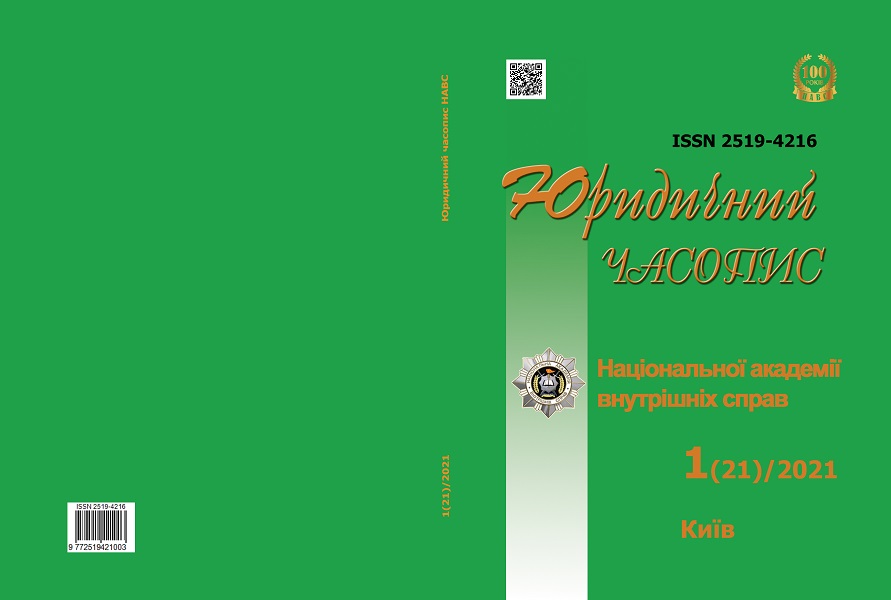Moral and Ethical Principles in the Activity of a Polygraphologist
Abstract
The purpose of the study – is to highlight a topical issue related to the introduction of moral and ethical principles in the professional activity of a polygraph specialist. Methodology. The methodological tools are chosen taking into account the goal, the specifics of the object and subject of research. It is a general dialectical method of scientific knowledge of real phenomena, as well as their connection with the theory and practice of introducing moral and ethical principles in the professional activity of a polygraph specialist. Also special research methods, namely: the method of system analysis, comparative law, system-structural and forecasting method. Scientific novelty. Taking into account new trends in the formation and development of the interdisciplinary science of polygraph, for the first time the need to raise the issue of introducing moral and ethical principles in the activities of a specialist polygraph. The content of its key components is revealed and the ways of ordering the existing existing gaps related to these principles in the activity of a polygraph specialist are suggested. The content of its key components is revealed and the ways of ordering the existing existing gaps related to these principles in the activity of a polygraph specialist are suggested. Conclusions. The scientific position is substantiated that the moral and ethical principles in the activity of a polygraph specialist are an important part of the whole polygraph process. They simultaneously perform both an educational and a controlling function without which the activity with the use of a polygraph is not completely orderly. The specifics of this field of scientific knowledge require polygraph examiners to pay special attention to people who, due to certain life circumstances, turn to this process and the professionals who provide it, in order to obtain additional information on specific issues relevant to them. The disorder of moral and ethical principles in the activities of a polygraph examiner leaves this process out of control, which can negatively affect the reputation of the specialist who provides it, and in general a negative attitude to polygraph activities and its specifics.
Keywords: polygraph; polygraph; polygraph examiner; moral and ethical principles of activity; communication.
Downloads
References
Аболіна Т., Надольний І. Мораль. Філософський енциклопедичний словник / [В. І. Шинкарук (голова редкол.) та ін.]. Київ : Ін-т філософії ім. Г. Сковороди НАН України ; Абрис, 2002. 742 с.
Професійна етика юриста : навч.-метод. посіб. (у схемах) / за наук. ред. В. С. Бліхара. Львів : Арал, 2018. 108 с.
Бралатан В. П., Гуцаленко В. Л., Здирко Н. Г. Професійна етика :навч. посіб. Київ : Центр учб. літ., 2011. 252 с.
Дідовець І. Особливості розвитку професійної етики на сучасному етапі. Збірник наукових праць Державного економіко-технологічного університету транспорту. 2015. №. 33. С. 245–253. (Серія «Економіка і управління»).
Gołaszewski M. Report from the 54th Seminar of the American Polygraph Association. European Polygraph (Poland). 2019. No. 3 (49). Р. 161–165. doi: 10.2478/ep-2019-0012.
Головіна Н. І. Моральні проблеми сучасного суспільства і статус етики. Філософські обрії. 2017. № 38. С. 80–88. doi: https://doi.org/0000-0003-2915-5869.
Horvath F. A Hundred Years of Polygraphy: Some Primary Changes and Related Issues. European Polygraph (Poland). 2020. Vol. 14. No. 1 (51). Р. 30–43. doi: 10.2478/ep-2020-0007.
Келле В. Ж. Интеллектуальная и духовная составляющие культуры. Вопросы философии. 2005. № 10. С. 35–39.
Клічук А. Свобода вибору особистості як проблема компромісу власних пріоритетів та соціального тиску. Науковий часопис. 2006. № 8. С. 144–149.
Куприна Н. Г., Масленникова С. Ф. Современные подходы к содержательной разработке понятий «нравственность» и «мораль». Современные проблемы науки и образования. 2015. № 4. С. 88–97.
Мотлях О. І. Спеціальні знання в поліграфології та їх особливості. Науковий вісник Національної академії внутрішніх справ. 2021. № 1 (118). С. 58–65. doi: https://doi.org/10.33270/0121118158.
Stanley M. Slowik. Critical Changes Over the 100 Year Evolution of Polygraph Practices. European Polygraph (Poland). 2020. Vol. 14. No. 1 (51). Р. 50–57. doi: 10.2478/ep-2020-0010.
Тофтул М. Етика : навч. посіб. Київ : Альма-матер, 2007. С. 163–172.
Тофтул М. Г. Сучасний словник з етики. Житомир : ЖДУ ім. І. Франка, 2014. 416 с.
Варламов В. А.,Половникова Ж. Ю. Правила профессионального поведения полиграфолога МАП (кодекс). Вестник полиграфолога. 2008. № 5. С. 57–64.
Widacki J., Szuba-Boron A. Polygraph Examinations of Civil Servants in Poland. European Polygraph (Poland). 2017. Vol. 11. No. 1 (39). Р. 15–23. doi: 10.1515/ep-2017-0002.
Заболотна Н. Я. Морально-етичні імперативи адвокатської діяльності: етимологія і сутність термінів. Юридичний науковий електронний журнал. 2020. № 7. С. 395–398. doi: https://doi.org/10.32782/2524-0374/2020-7/99.
Abstract views: 296 PDF Downloads: 232
Copyright (c) 2021 Law Magazine of the National Academy of Internal Affairs

This work is licensed under a Creative Commons Attribution-NonCommercial-NoDerivatives 4.0 International License.
- Authors reserve the right to authorship of their own work and transfer to the magazine the right of the first publication of this work under the terms of the Creative Commons Attribution License, which allows other persons to freely distribute published work with mandatory reference to authors of the original work and the first publication of an article in this magazine.
- Authors have the right to enter into separate additional agreements on non-exclusive dissemination of the work in the form in which it was published in the journal (for example, to post an article in the institution's repository or to publish as part of a monograph), provided that the link to the first publication of the work in this journal is maintained.
- The journal's policy allows and encourages the posting of articles by authors on the Internet (for example, in electronic storehouses of institutions or on personal websites), both before the submission of this manuscript to the editorial office and during its editorial processing, as this contributes to the creation of a productive scientific discussion and positively affects the efficiency and dynamics of citing the published work.




